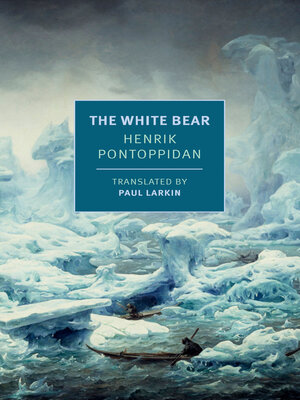
Sign up to save your library
With an OverDrive account, you can save your favorite libraries for at-a-glance information about availability. Find out more about OverDrive accounts.
Find this title in Libby, the library reading app by OverDrive.



Search for a digital library with this title
Title found at these libraries:
| Library Name | Distance |
|---|---|
| Loading... |
Love, faith, and the political mingle in these two short novels by a Nobel Prize-winning Danish author. One about a young couple making a new life in Rome, the other about a priest who goes to live among native peoples in Greenland, both books explore the reaches of the human heart through their complex and unforgettable characters.
Henrik Pontoppidan, the Danish Nobel laureate, is admired for the concentrated force of his novellas as much as for long, populous, world-encompassing novels like A Fortunate Man, and here are two of those novellas, newly and brilliantly translated by Paul Larkin.
The White Bear follows the fate of the odd, gangly, red-bearded Thorkild Müller. Born in rural Jutland and destined for the ministry, Thorkild proves to be a poor student and is assigned to a remote Inuit tribe in Greenland. There, with his mythic-looking staff and dogskin skullcap, he becomes known as the White Bear—a beloved legend among the locals and a freewheeling embarrassment to his fellow priests. Grown old, he returns to Denmark, where again his flock adores him while his fellow men of cloth try to tame the "whirling dervish in their midst." In the end Thorkild mysteriously disappears, presumably back to the snow wilderness of Greenland.
The Rearguard, on the other hand, is a marriage story. Newlyweds Jørgen Hallager and Ursula Branth are as different as night and day. The brash son of a poor village teacher, Jørgen is an avowed socialist whose revolutionary beliefs translate into his work as a painter of social realism; Ursula comes from a conservative, upper-middle-class family. At first, as they start their married life in Rome, they each try to change the other's worldview with arguments and threats, but as time wears on and they wear each other down, it becomes clear there can be no reconciliation. It is a tragic tale of art and idealism, individuality and love.
This translation was funded in part by a grant from the Danish Arts Foundation.
Henrik Pontoppidan, the Danish Nobel laureate, is admired for the concentrated force of his novellas as much as for long, populous, world-encompassing novels like A Fortunate Man, and here are two of those novellas, newly and brilliantly translated by Paul Larkin.
The White Bear follows the fate of the odd, gangly, red-bearded Thorkild Müller. Born in rural Jutland and destined for the ministry, Thorkild proves to be a poor student and is assigned to a remote Inuit tribe in Greenland. There, with his mythic-looking staff and dogskin skullcap, he becomes known as the White Bear—a beloved legend among the locals and a freewheeling embarrassment to his fellow priests. Grown old, he returns to Denmark, where again his flock adores him while his fellow men of cloth try to tame the "whirling dervish in their midst." In the end Thorkild mysteriously disappears, presumably back to the snow wilderness of Greenland.
The Rearguard, on the other hand, is a marriage story. Newlyweds Jørgen Hallager and Ursula Branth are as different as night and day. The brash son of a poor village teacher, Jørgen is an avowed socialist whose revolutionary beliefs translate into his work as a painter of social realism; Ursula comes from a conservative, upper-middle-class family. At first, as they start their married life in Rome, they each try to change the other's worldview with arguments and threats, but as time wears on and they wear each other down, it becomes clear there can be no reconciliation. It is a tragic tale of art and idealism, individuality and love.
This translation was funded in part by a grant from the Danish Arts Foundation.







